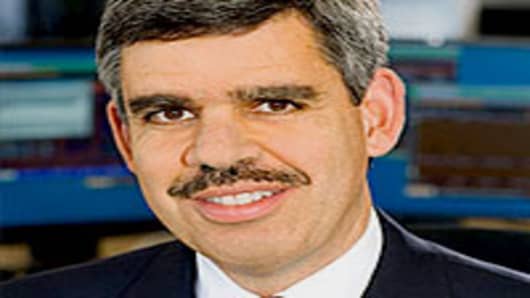More European countries will need bailouts until policy makers address the underlying causes of their financial problems, which include too much government debt and not enough spending controls, Pimco's Mohamed El-Erian told CNBC.
The CEO of the world's largest bond manager said balance sheet issues will cause Europe to be "a slow-motion wreck" that will cause crises in "Ireland, then Portugal, then Spain, then Belgium, then Italy."
"The first rule of crisis management hasn't been met by the Europeans, and that is to get ahead of the crisis, be seen as proactive rather than reactive," El-Erian said. "As long as they're being seen as reactive we're going to have a slow-motion wreck going on on in Europe. We're going to wake up and it's going to be a new country we're talking about."
Though each country has its own issue—in some cases it's banks' problem loans contaminating the government's balance sheet, in others it's the government's problem primarily—but the root is essentially the same.
A nearly $1 trillion International Monetary Fund bailout allocation has helped address liquidity concerns in Ireland. But the worry, El-Erian said, is what happens with addressing balance sheet and actual solvency issues with the various institutions unable to pay their debts.
"Unless we see more than just liquidity support, unless we see something that deals with the balance sheets, expect this contagion to go up," he said.
The problems in Europe have roiled world markets and essentially counteracted the Federal Reserve's moves to pump money into the economy by buying Treasurys.
Instead of the dollar weakening that would be expected to follow the Fed's $600 billion quantitative easing action, the US currency has strengthened against the euro. That in turn has pressured US stocks, which opened lower Tuesday.
El-Erian said investors, then, ought to be looking for opportunities to buy non-European debt that has been sold heavily in response to the European crisis. He recommended emerging markets with high reserve levels, high-quality corporate bonds, as well as currencies "around the world being contaminated by what's happening in Europe."
While the IMF bailout likely has prevented a default by Ireland for as many as three years, it is far less certain whether the temporary fix will address long-term problems.
"The problem if you tell creditors that at 2013 something's going to happen, creditors will try to move ahead of that. That's what we're seeing today," El-Erian said. "We're seeing people exit European exposures because...they're afraid that this time line may change."



